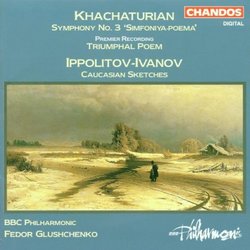| All Artists: Aram Khachaturian, Fedor Glushchenko, BBC Philharmonic Orchestra Title: Khachaturian: Symphony 3 / Triumphal Poem Members Wishing: 0 Total Copies: 0 Label: Chandos Release Date: 1/24/1995 Genre: Classical Styles: Forms & Genres, Theatrical, Incidental & Program Music, Historical Periods, Modern, 20th, & 21st Century, Symphonies Number of Discs: 1 SwapaCD Credits: 1 UPC: 095115932124 |
Search - Aram Khachaturian, Fedor Glushchenko, BBC Philharmonic Orchestra :: Khachaturian: Symphony 3 / Triumphal Poem
 | Aram Khachaturian, Fedor Glushchenko, BBC Philharmonic Orchestra Khachaturian: Symphony 3 / Triumphal Poem Genre: Classical
|
Larger Image |
CD Details |
CD ReviewsAn Outstanding Disc D. A Wend | Buffalo Grove, IL USA | 03/06/2003 (5 out of 5 stars) "This recording was highly recommended by Gramophone for the excellent performances by the BBC Philharmonic, particularly of the Khachaturian works. Chandos should also be complimented on the wonderfully clear quality of the recording. Aram Khachaturian is among my favorite composers; he wrote colorful melodies that are very appealing. The main interest on this disc is Khatchaturian's Third Symphony, a work premiered along with Prokofiev's Sixth Symphony in 1947. Both works got their composers in trouble for their "modernism". Khatchaturian's symphony is noteworthy for the 18 trumpets called for in the score, which play a fanfare in seven parts that is undercut by an organ. The music shows Khachaturian experimenting musically. This is not just a work of bombast with the brass playing triumphal music; it also has a slow movement reminiscent of the beautiful slow movements from his piano and violin concertos. The Triumphal Poem is a piece d'occasion like Shostakovich's Festival Overture. It is music that the Communist Party could appreciate since it is meant to describe people rejoicing in a great people's festival. The Triumphal Poem is charming music as befits a celebration and is, characteristically of Khatchaturian, is a little long winded. The performance of Ippolitov-Ivanov's Caucasian Sketches makes a nice pairing. The work is perfectly played, with the exotic and colorful depiction of places and people wonderfully conveyed. Certainly, the best know part of this suite is the Procession of the Sardar, a march that seems to perfectly describe a sultan and his entourage. "In the Village" makes use of exotic colors convey the many facets of village life and "In the Mosque" is quiet and contemplative. The suite beautifully conveys the place it is meant to describe the Caucasian Mountains." Powerful and compelling Benjamin R. Garrison | Lynnwood, WA United States | 05/16/2001 (5 out of 5 stars) "I'm a relative newcomer to the music of Khachaturian and I'm a little surprised that his work isn't more popular. You may hear his 'Masquerade Suite' on the radio and that's about it. He deserves a lot more play.Khachaturian has a distinctive 20th-century style and yes, it can get LOUD. I bought this particular CD after listening to his 2nd Symphony and his piano concerto (I also highly recommend both).The most distinctive thing about this symphony is the organ. It sounds obsessive, fanatical and POWERFUL. Saint Saens put an organ in his symphony and so did Tchaikovsky (Manfred Symphony) and they were charming. Khachaturian's is more spellbinding and driven than charming. You'll hear nothing like this in church.There is depth and melody here too. A memorable listening adventure awaits you." Loud and exciting Erik Homenick | San Diego, California | 12/31/2005 (5 out of 5 stars) "Khachaturian's 3rd Symphony must be one of the most under-played and under-appreciated orchestal works of the 20th century. This is good ol' bombastic Aram at his best; count 'em...15 trumpets cry out in triumph to open this piece and whet the listener's appetite for the big music to come. Then the demonically possesed organ begins to sound; this is "haunted house" music par excellence. Of course, exotic dance rhythms and melodies abound here too, a Khachaturian trademark. As a whole, this music is loud, loud, loud and the sonics of this Chandos recording catch all the details. It can't get much better.
A workable treatment is given to Ippolitov-Ivanov's CAUCASIAN SKETCHS, no doubt included on this recording to accompany the Trans-Caucasian musings of Khachaturian. The most famous of the sketchs, PROCESSION OF THE SARDAR dissapoints the most; it lacks the needed "oomph" to really bring the piece to life. Notwithstanding, the rest of Ippolitov-Ivanov's evocative orchestral suite is performed much more authentically. Khachaturian's TRIUMPHAL POEM is a rare gem. Ok, so this Soviet-era music is unabshely nationalistic, but it remains good spirited and fun. Highly recommended, especially for the 3rd Symphony." |

 Track Listings (6) - Disc #1
Track Listings (6) - Disc #1